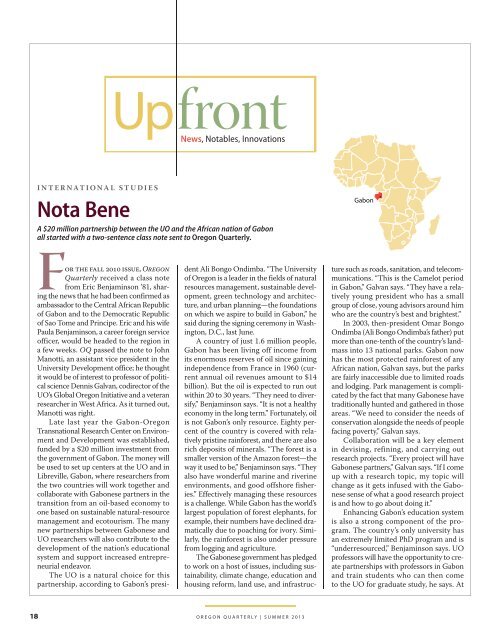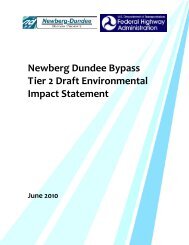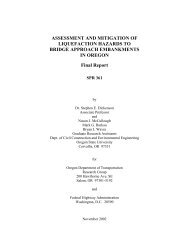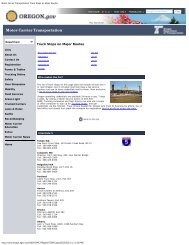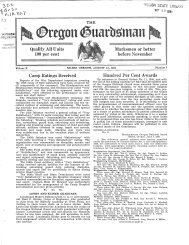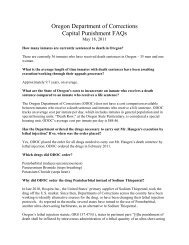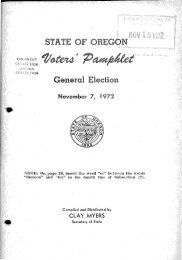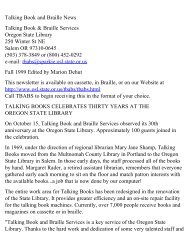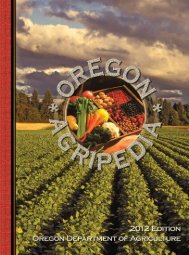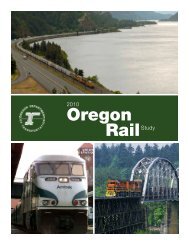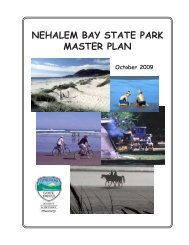Summer 2013 - Oregon State Library: State Employee Information ...
Summer 2013 - Oregon State Library: State Employee Information ...
Summer 2013 - Oregon State Library: State Employee Information ...
You also want an ePaper? Increase the reach of your titles
YUMPU automatically turns print PDFs into web optimized ePapers that Google loves.
INTERNATIONAL STUDIES<br />
Nota Bene<br />
A $20 million partnership between the UO and the African nation of Gabon<br />
all started with a two-sentence class note sent to <strong>Oregon</strong> Quarterly.<br />
FOR THE FALL 2010 ISSUE, OREGON<br />
Quarterly received a class note<br />
from Eric Benjaminson ’81, sharing<br />
the news that he had been confirmed as<br />
ambassador to the Central African Republic<br />
of Gabon and to the Democratic Republic<br />
of Sao Tome and Principe. Eric and his wife<br />
Paula Benjaminson, a career foreign service<br />
officer, would be headed to the region in<br />
a few weeks. OQ passed the note to John<br />
Manotti, an assistant vice president in the<br />
University Development office; he thought<br />
it would be of interest to professor of political<br />
science Dennis Galvan, codirector of the<br />
UO’s Global <strong>Oregon</strong> Initiative and a veteran<br />
researcher in West Africa. As it turned out,<br />
Manotti was right.<br />
Late last year the Gabon-<strong>Oregon</strong><br />
Transnational Research Center on Environment<br />
and Development was established,<br />
funded by a $20 million investment from<br />
the government of Gabon. The money will<br />
be used to set up centers at the UO and in<br />
Libreville, Gabon, where researchers from<br />
the two countries will work together and<br />
collaborate with Gabonese partners in the<br />
transition from an oil-based economy to<br />
one based on sustainable natural-resource<br />
management and ecotourism. The many<br />
new partnerships between Gabonese and<br />
UO researchers will also contribute to the<br />
development of the nation’s educational<br />
system and support increased entrepreneurial<br />
endeavor.<br />
The UO is a natural choice for this<br />
partnership, according to Gabon’s president<br />
Ali Bongo Ondimba. “The University<br />
of <strong>Oregon</strong> is a leader in the fields of natural<br />
resources management, sustainable development,<br />
green technology and architecture,<br />
and urban planning—the foundations<br />
on which we aspire to build in Gabon,” he<br />
said during the signing ceremony in Washington,<br />
D.C., last June.<br />
A country of just 1.6 million people,<br />
Gabon has been living off income from<br />
its enormous reserves of oil since gaining<br />
independence from France in 1960 (current<br />
annual oil revenues amount to $14<br />
billion). But the oil is expected to run out<br />
within 20 to 30 years. “They need to diversify,”<br />
Benjaminson says. “It is not a healthy<br />
economy in the long term.” Fortunately, oil<br />
is not Gabon’s only resource. Eighty percent<br />
of the country is covered with relatively<br />
pristine rainforest, and there are also<br />
rich deposits of minerals. “The forest is a<br />
smaller version of the Amazon forest—the<br />
way it used to be,” Benjaminson says. “They<br />
also have wonderful marine and riverine<br />
environments, and good offshore fisheries.”<br />
Effectively managing these resources<br />
is a challenge. While Gabon has the world’s<br />
largest population of forest elephants, for<br />
example, their numbers have declined dramatically<br />
due to poaching for ivory. Similarly,<br />
the rainforest is also under pressure<br />
from logging and agriculture.<br />
The Gabonese government has pledged<br />
to work on a host of issues, including sustainability,<br />
climate change, education and<br />
housing reform, land use, and infrastructure<br />
such as roads, sanitation, and telecommunications.<br />
“This is the Camelot period<br />
in Gabon,” Galvan says. “They have a relatively<br />
young president who has a small<br />
group of close, young advisors around him<br />
who are the country’s best and brightest.”<br />
In 2003, then-president Omar Bongo<br />
Ondimba (Ali Bongo Ondimba’s father) put<br />
more than one-tenth of the country’s landmass<br />
into 13 national parks. Gabon now<br />
has the most protected rainforest of any<br />
African nation, Galvan says, but the parks<br />
are fairly inaccessible due to limited roads<br />
and lodging. Park management is complicated<br />
by the fact that many Gabonese have<br />
traditionally hunted and gathered in those<br />
areas. “We need to consider the needs of<br />
conservation alongside the needs of people<br />
facing poverty,” Galvan says.<br />
Collaboration will be a key element<br />
in devising, refining, and carrying out<br />
research projects. “Every project will have<br />
Gabonese partners,” Galvan says. “If I come<br />
up with a research topic, my topic will<br />
change as it gets infused with the Gabonese<br />
sense of what a good research project<br />
is and how to go about doing it.”<br />
Enhancing Gabon’s education system<br />
is also a strong component of the program.<br />
The country’s only university has<br />
an extremely limited PhD program and is<br />
“underresourced,” Benjaminson says. UO<br />
professors will have the opportunity to create<br />
partnerships with professors in Gabon<br />
and train students who can then come<br />
to the UO for graduate study, he says. At<br />
18 OREGON QUARTERLY | SUMMER <strong>2013</strong>


